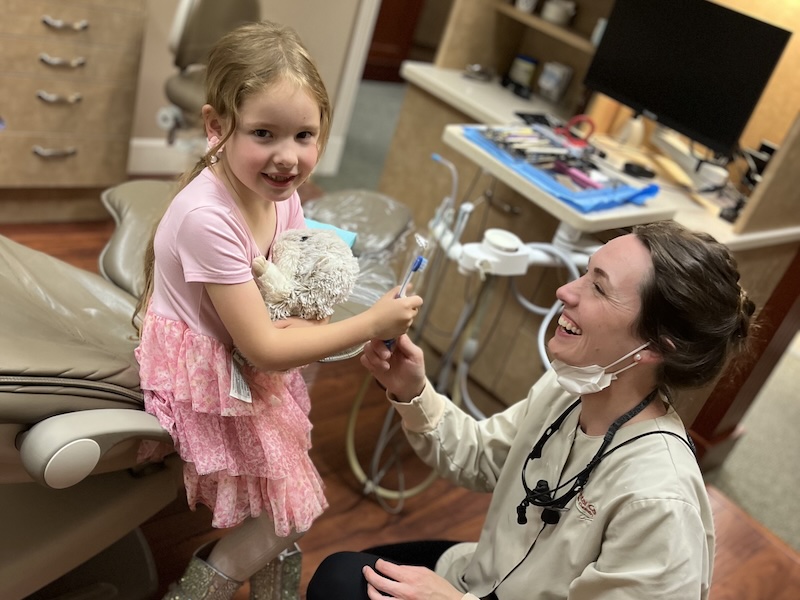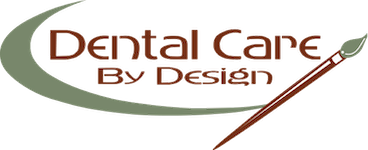Hello, I'm Elizabeth Kesler, a dental hygienist here at Dental Care by Design. We get a lot of questions about dental hygiene, so today, I'm going to answer some of the most common questions on this topic. I'll give you answers to help you better understand the role of dental hygiene and what you can expect from an appointment with a dental hygienist.
What is proper dental hygiene?
Proper dental hygiene involves using any tools or devices you have access to for keeping your teeth and gums clean. The very basic tools can be the most effective as well. A toothbrush and floss are sufficient aids to maintain good health. Proper teeth and gum hygiene involves using a toothbrush and toothpaste daily, and flossing usually in the morning and at night. Nighttime is essential to keep the teeth clean right before you go to sleep. Bacteria that cause bone loss and tooth loss are most active at night while we're sleeping. During the day, it is ideal to brush your teeth after lunch. However, I understand that it might not always be possible. In this case, simply rinsing your mouth with water will help remove any food residue and allow your teeth and gums to benefit from having bacteria washed away. Also, chewing some sugarless gum, especially with xylitol in it, can reduce bacterial activity after a meal.
What can happen if I don't practice good dental hygiene?
Anyone who doesn't follow daily oral hygiene routines can experience inflammation in their mouth from excessive dental plaque and bacteria. The signs of inflammation are bleeding gums, puffy, red gums, and sometimes even pain in your gums. As a dental hygienist, I will only see you a few times a year, and you see your teeth every single day. It's important for you to keep your teeth and gums clean between your professional visits or checkups with the dentist. As a dental hygienist, I encourage my patients to clean their teeth and gums at home every day to prevent inflammation in the mouth, which can lead to systemic illness and eventual tooth loss.
What are the main duties of a dental hygienist?
A dental hygienist is a skilled practitioner who removes debris from the teeth, gathers information about your health status, including medication and any surgeries you might have had, and determines what kind of cleaning you need by measuring your gums and taking X-rays. A dental hygienist is a team player dedicated to the health of your mouth and body. I'm also someone you might become most comfortable with because we spend a lot of time together.
What is involved in a dental cleaning?
A dental hygienist first measures your gums and assesses your health condition. Regular dental cleanings usually take less than an hour and are straightforward due to the healthy tissue in the mouth. A regular dental cleaning involves using hand scaling instruments to remove dental plaque and tartar from your teeth. In some cases, for heavier plaque, tartar, or stain, I might use a professional water pick. This is an ultrasonic-powered device that helps remove all hard and soft debris on the surface of the tooth. It is also really helpful for removing the stain on the teeth that can build up due to things we eat and drink. At the end of the cleaning, I polish and floss to remove any extra stain and plaque that have stuck after using the ultrasonic scaler and hand tools. Polishing the teeth helps make them smoother and prevents bacteria from adhering to the tooth surface. Smooth teeth are usually not an easy surface for bacteria to stick to.
What kind of tools does a dental hygienist use?
I use hand instruments for removing debris. They usually have a sharp edge, and sharp tools are easier to work with than dull ones, so I sharpen them regularly. I also use an ultrasonic-powered device that moves at a high frequency and removes debris from the tooth surface. I have a small polishing tool that I use with a special polishing paste, and I use floss. At the end of an appointment, I apply fluoride varnish on teeth to prevent decay or sensitivity. For people with very sensitive gums and teeth, I use a special topical numbing gel around the gums and rinse the teeth with warm water to make the cleaning experience more comfortable.
Does a teeth cleaning hurt?
Does a teeth cleaning usually hurt? No, it's not normal for the teeth to hurt. However, there are times when patients experience discomfort while I'm scaling or using the ultrasonic device. This can be simply because the vibrations of the instruments can activate the nerve inside the tooth. If there's discomfort of the gums, it can be due to inflammation. That's a great time for me to explain to a patient what's happening in their mouth and how they can avoid it in the future. For patients who have recession, where the gums have moved away from the crown of the tooth and exposed the roots, there can be some discomfort because of that exposed root surface. I often use a desensitization agent put out by Colgate to help with the discomfort. I always try to let the patient's pain level dictate how I take care of them. In extreme cases, we can perform a local anesthetic so that a patient is completely numb and comfortable during their dental hygiene treatment.

How long should a typical dental cleaning take?
Typical dental cleanings take about one hour. During this time, you might need to have X-rays taken. Your gums will be measured once a year, and the debris around your teeth will be removed, including plaque, stain, and tartar. We call it calculus because it's calcium-based. You might also have your checkup from your dentist once or twice a year.
Why is a deep cleaning by a dental hygienist necessary?
Sometimes, due to the amount of buildup on a patient's teeth, a regular cleaning isn't enough to keep the gums and bone healthy. There can be a lot of tartar built up underneath the gums, leading to inflammation of the gums and bone, and eventual bone and tooth loss. Inflammation around the teeth can also affect the rest of the body. Our heart, blood vessels, kidneys, and brain are all affected by inflammation from the mouth that can spread around the body through the bloodstream. In some cases, severe inflammation and bacteria go deep into the gums and cause necrosis of the teeth. This is when the tooth becomes dead and infected deep inside the bone. Untreated cases of severe gum inflammation will lead to tooth loss. By performing a deep cleaning when necessary, we prevent inflammation from spreading throughout the body and keep the teeth safe.
What should I do after my teeth are cleaned?
Patients often ask if there's anything they need to do after having their teeth cleaned. Usually, there's no special care needed at home. We encourage you to brush and floss your teeth daily, especially at nighttime, to prevent tooth decay and gum disease. If you've had a deep cleaning, you might be instructed by your dental hygienist or dentist to use warm saltwater rinses and a gentle toothbrush to help the gums heal faster. For patients experiencing dry mouth and high rates of tooth decay, we offer a special prescription-strength toothpaste designed to reduce decay and relieve dry mouth symptoms.
How should I schedule a dental hygiene appointment?
You can call us here at Dental Care by Design and ask our front office personnel to schedule you for a dental cleaning. During your first cleaning, we will probably take X-rays and measure your gums to determine the type of cleaning you'll need. If you need a regular adult cleaning, that will be done at your first appointment. If you require a deep cleaning, you'll be rescheduled to start the deep cleaning at your next visit with us.
I hope I've been able to answer some of your questions on dental hygiene. If you have additional questions or want to schedule an appointment, please call us at (360) 800-2372. We're here to help.

